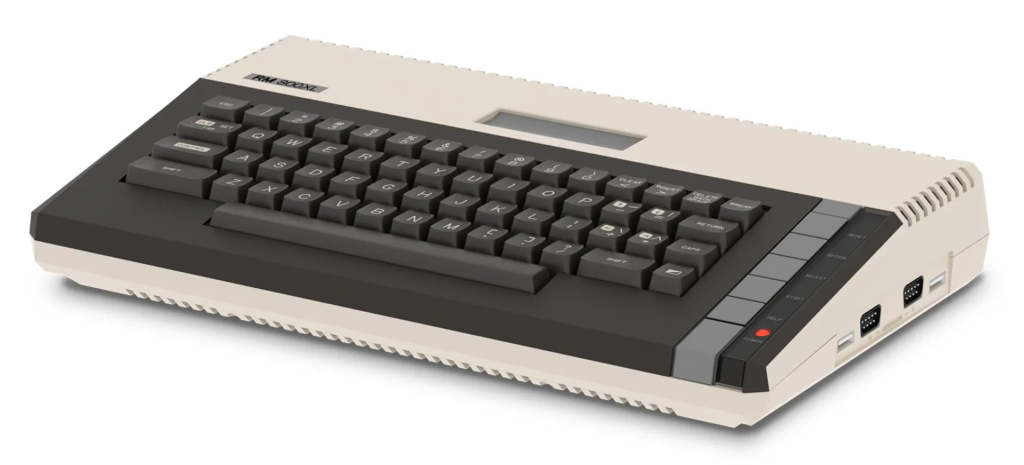Spring and Atari!
Spring! Atari!
Hi. It’s been a while since the last update, but I can honestly blame the fact that the site is a one-man venture, and it was dense enough in paid work. The opposite of the small, quiet 8-bit world. 😉
I’ll start with two solid recommendations, both related to Atari:
Once Upon a Time in Atari: How I made history by killing the gaming industry
A great book, in retrospect, showing us historical moments in the video game industry, such as hacking together the game E.T. on Atari in 5 weeks. It’s still called the worst game in history. It shows us how it all happened and what a strange place the Atari offices were. Suffice it to say that some literally ran on the walls there.
A good part of the story tells us how the behavior of technology companies turned their gigantic success into the “collapse of the industry”. One of the effects of this fall was to bury a lot of E.T. game cartridges in a landfill… The author of the book, being also the author of the game, did not know how true these burial stories were. But he appeared on the spot to find out (and tell us) about it when, decades later, they returned to the site with excavators.
Once Upon Atari: How I made history by killing an industry: Warshaw, Howard Scott: 9780986218668: Amazon.com: Books
The Polish remake of the Atari 800XL is coming!
After the success of The C64 (2020) and the Amiga 500 Mini (2022), the slightly less commercial, as it was crowdfunded, but undoubtedly successful appearance of the ZX Spectrum Next (2020), as well as projects such as Spectrum Vega (2015), the Atari Flashback series (2004+) and NES Classic Edition (2016) and of course after the MEGA 65, it’s time for Atari with a keyboard.
I like keyboards. I’m a fan of keyboards. I could talk about it for a long time. In the case of recreation of old computers, this is all the more obvious — I want to have a “full experience”, the ability to interact with the computer in the same or more pleasant way than in the original. That’s why Spectrum Vega, Atari Flashback, or Amstrad’s last “gaming” work – GX4000 – I would like to sweep it under the carpet and pretend that they did not happen.
Here, however, we are dealing with a full-size Atari with a keyboard – a brand new 800XL!

Revive Machines (revive-machines.com). We get USB and HDMI, but all the original connectors and cartridge port still work! For now, not much is known about this project, but you can certainly expect it to work as well with the original pad and cartridge, or even a monitor, as with HDMI pads, a game or software loaded with USB, and a monitor or TV connected via HDMI. The best of both worlds!
The electronics will probably be driven by the FPGA system, giving high hardware compatibility with the original.
I’m sure sooner or later I’ll be able to do a review 😉 First I have to finish the material about the M65…
Polish pixels
Speaking of Polish accents! It is worth taking a look at the page about Polish games for retro systems — Polish Pixels
I’ll be happy to walk around them and play each one in turn. Most of them I’ve probably never seen before.
I like keyboards
Offtopic: keyboards and headphones I have built a collection in my life. Currently, the leaders in both categories are: Tex Shinobi and Bose 700, respectively. The Tex Shinobi keyboard is an obvious heritage of the so-called classic ThinkPad keyboards, in which the buttons were still properly contoured, slightly concave, without spaces between them, so that the fingers themselves found the right position reflexively and within milliseconds. The old ThinkPad laptop keyboards are the best I’ve had the opportunity to work with in a laptop. In second place will be the Epson PX8.
Comfortable and well-contoured buttons are worth their weight in gold for anyone who spends a lot of time with the computer. I also highly value ergonomic keyboards like the Microsoft Sculpt (minus for build quality), but Shinobi has the advantage of a well-functioning (but not as good as in the Thinkpad) trackpoint, making it much less likely to have to take your hand off the keyboard at all.
I also love mechanical keyboards that provide a clear click the moment the button “snaps”. The actuation point, when properly tactile, somehow makes it much easier for the brain to operate intuitively, and faster.
One day I’ll build an Amstrad CPC6128 a new mechanical keyboard.


